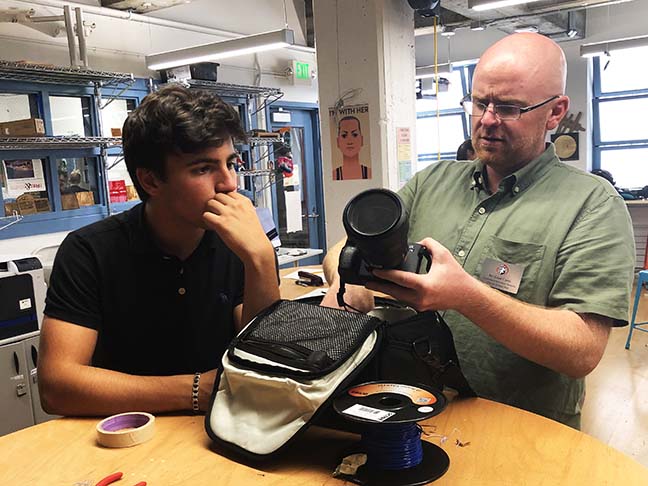Electronic equipment now available for use
Digital Media Library opens in Spark Studio
Liam Carey, Computer Science and Digital Design instructor, shows junior Eon Kounalakis a Sony camera from the Digital Media Library. In preparation for the school year, the Department of Tech and Innovation set up AssetTiger, a program that facilitates keeping track of the equipment and sends notification emails to users.
The Department of Tech and Innovation launched a comprehensive Digital Media Library in late August.
“The library is simply about 100 items we have either purchased or collected for students and faculty to be able to check out and use,” Howard Levin, Director of Educational Innovation and Information Services, said.
Based in the Spark Studio, the library also has cameras, microphones, lighting equipment, stands, headsets, lightning port converters and other peripheral devices.
“The Digital Media Library is a tool to support students as producers,” Levin said. “It is one tool to help dramatically increase the quality and the breadth and the depth of what is possible for students to use to create really professional work.”
About half of the equipment is already circulating throughout the community, though Levin says he is not ready for a deluge of people to start using the library.
“A lot of the equipment in there we’ve never actually touched ourselves,” Levin said. “We’re listing the very expensive stuff as restricted. It’s only going to be checked out to the people whom I have the confidence will be able to treat it well and learn it and figure it out.”
Members of the Department of Tech and Innovation stress their mission to provide materials students of all ages need to advance their production skills.
“We’ve got third graders, fourth graders checking stuff out, so it’s exciting,” Educational
Innovation Coordinator Krista Inchausti said. “The vision is to give our students the tools they need to become producers and makers, makers of their own
projects, makers of their own images, makers of their own
meaning.”
Although the library is accessible to all, some students said they never heard about it.
“I wish that I had known about this beforehand because many of my filmed projects and audio
recordings could have had better quality,” junior Jaylen Chu said. “Microphones could be good for recording an audio essay for
language class and video cameras could be useful for recording
science experiments,” Chu said.
Levin says he wants to expand the library’s usability by allowing students to take the lead.
“A lot of what’s going on — specifically among the adults — is that they’re afraid to touch any of this stuff because they don’t know how to use it,” Levin said. “I’m trying to put together some teams of students to make demo videos of some of the equipment.”
Levin says he hopes the Digital Media Library will inspire students to embody their role as producers.
“The vision is that we start to see truly professional work being done, and not just for class projects, but also to help nurture creativity and creative passions,” Levin said. We want to use the Digital Media Library to help spark even more of what I call real world work.”

